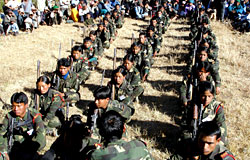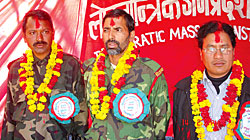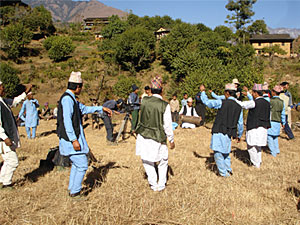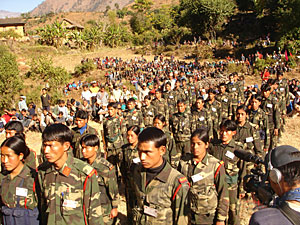 With less than two weeks to go before their ceasefire extension expires on 3 January, the Maoists say they are now training their sights on the capital.
With less than two weeks to go before their ceasefire extension expires on 3 January, the Maoists say they are now training their sights on the capital.
In briefings to select journalists taken to their heartland in Rukum earlier this month, senior rebel commanders hinted they were following a two-track policy of using the political process and, if that path is blocked, step up guerrilla attacks in and around the capital to pressure the regime.
The Maoists have been holding large meetings this month throughout the midwest from where they launched the war 10 years ago. The aim is to explain the decisions taken at their central committee meeting and also the deal struck with the seven-party alliance. Their battle cry is: "To Kathmandu."
One of the videos shown at the rallies depicts Pushpa Kamal Dahal (Prachanda) wiping tears as he watched an opera about fallen 'martyrs' titled Yuddha Maidan Bata Pharkada (Returning from the Battlefield). This grab (right) from the video is the most recent picture of Dahal and shows a dapper comrade with graying hair and moustache. The video was taken after the central committee in Chungbang on the Rolpa-Rukum border in October.
In a statement on Thursday, Prachanda and Baburam Bhattarai said their party would disrupt municipal polls scheduled for 8 February. In a separate statement in English aimed at donors, Prachanda said he had instructed his cadre to respect their Basic Operating Guidelines and 'cooperate as per the specific (local) situation'. The Maoists also call on donors to work in close consultation with them. Speaking to the press on Thursday evening, UN resident coordinator, Matthew Kahane, welcomed the move.
"To Kathmandu"
The Maoists have a new strategy
SHIVA GAUNLE in RUKUMKOT
 People of Rukum who have endured 10 years of war don't know quite what to make of the Maoists anymore.
People of Rukum who have endured 10 years of war don't know quite what to make of the Maoists anymore.
At a mass meeting in their stronghold of Bhawang on 10 December, the rebels announced the start of their 'people's democratic campaign'. Four days later in Rukumkot they asked people gathered to offer criticism of their conduct!
For a group that has for the past decade liquidated anyone who didn't agree with them, this was new. Needless to say no one got up to complain about anything. But privately, a teacher took aside a Kathmandu-based journalist and said: "They have been taking half of our salary, we have to devote half our time to them, how can we trust what
they say?"
Despite turning over a new leaf with the 12-point agreement with the political parties in faraway Kathmandu, it looks like local rebel commanders will have to do more if they want to regain the people's trust. Nevertheless, regional leaders of the Maoists have been repeatedly promising that they will abide by the provisions of the agreement to establish a 'democratic republic'.
We followed the rebel leadership down to Salyan where there was another public meeting to explain the party's position. The comrades were keen to show they haven't given up the military option. In fact, militia training is in full swing and a new strategy has been worked out to take the conflict to the capital.
"Feudalism can't be abolished by attacking small security posts in the villages, we will now aim at Kathmandu," said Netra Bikram Chand (Comrade Biplab) who is in charge of the 'Central Base Area' that includes Rukum, Rolpa, Salyan and Pyuthan.  The Maoists have also decided to increase the number of their military divisions from three to seven. One of the four deputy commanders under Prachanda is Janardan Sharma (Comrade Prabhakar) and it is clear the rebel rank and file regard the lanky man with a goatee with respect. He tells us his party's strategy has now shifted from a rural focus to being urban-centred after the plenum held two months ago decided to 'hit the bastion of feudalism'.
The Maoists have also decided to increase the number of their military divisions from three to seven. One of the four deputy commanders under Prachanda is Janardan Sharma (Comrade Prabhakar) and it is clear the rebel rank and file regard the lanky man with a goatee with respect. He tells us his party's strategy has now shifted from a rural focus to being urban-centred after the plenum held two months ago decided to 'hit the bastion of feudalism'.
"Since the royal palace is not going to easily accept the establishment of a people's democracy, we need to strengthen the military in order to bolster the people's power," Prabhakar told us.
Indeed, in a recent issue of the Naya Dishabodh, Prachanda is quoted as saying: "Our new strategy is to mobilise the party workers in the east to look westward and those in the west to look eastward.so that we can climb on the back of the giant and hit its head."
It is now clear that the Maoists have used the ceasefire period to develop the capacity to make headline-grabbing attacks in or around Kathmandu. However, the leaders say the threat on Kathmandu is a deterrence in case the army decides to crack down on the parties.
Before concluding, Comrade Biplab wanted to make sure one message got through: "The moment the king cracks down on the parties and civil society our army will march on Kathmandu."
WEB EXCLUSIVE | PHOTO GALLERY
ALL PICS: GIRISH POKHREL/NEPALI POST








